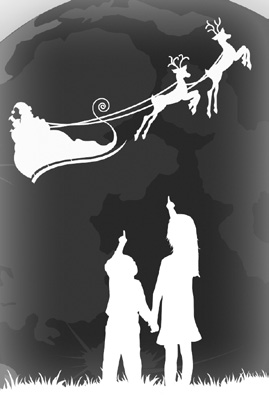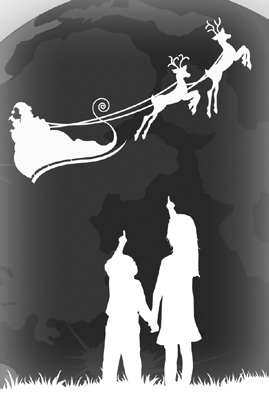Santa's Newest Reindeer (4 page)
Read Santa's Newest Reindeer Online
Authors: Denis Trom

her unwillingness to admit she was wrong and simply ask for
forgiveness. One time, her mother had questioned whether
: 23
:
De n is t rom
Ellie had watered the plants. Although Ellie had forgotten,
she insisted that she had watered them. One of the plants died,
and her mother had dug up the dried-out roots to show Ellie
that it hadn’t been watered. To this day Ellie would swear that
the plants died mysteriously. On most occasions, Will was the
diplomat who tried to bring peace between the two factions by
encouraging each party to compromise. Sometimes he prevailed,
but more often he didn’t.
“The city fathers are very powerful when it comes to making
and enforcing new rules,” Mom interjected, shaking her head in
doubt. “The newly elected city fathers are really representatives of the people. They campaigned on promises of representing us,
and we are the people they should represent.” They all nodded
in agreement.
“Blame it on the economy and electrical cost! That is baloney,”
asserted Ellie. She put her hands on her hips and struck that
defiant pose they had all seen before. When her face turned
red, her freckles disappeared.
“Uh-oh, what are you thinking?” asked Will in a cautious
tone. When stressed, Will became rather quiet. He chose his
words carefully before he spoke. He’d rather ask more questions
before offering an opinion, hoping they would answer their
own question. Most certainly, Will was overly cautious about
telling anybody what to do.
“I don’t know, but I’m going to the city meeting tomorrow to
change their minds.” Ellie had that combative look. She stood
taller than her true height, and there was fire in her voice. Ellie never backed away from a fight, especially when she thought
she was right. And she was on the right side of this fight! The
: 24
:
s a n ta' s n e w e s t r e i n Deer
four adults snickered, which provided a timely stress reliever.
“Enough discussion on that for now. It’s time for supper. We
didn’t have time to prepare your favorite meatloaf and potatoes,
so soup will have to do for tonight,” lamented Mom as she and
Grams pointed the way to the dinner table.
“You can call me whatever you want, but don’t call me late
for dinner. Besides, soup is good for the soul,” joked Gramps
as he led the way. Gramps always seemed to know when to
interject some humor into a tense discussion.
“Yup! Soup is good for the soul, and Gramps is good for us
all,” added Dad, joining the march to the dinner table.
“Mom’s soup and Gramps’ wit seem to go well together,
especially right now,” quipped Will.
“Let’s eat. I’m starved,” countered Ellie.
: 25
:

Four
When the table had been cleared and the leftovers refriger-
ated, it was the Taylor family tradition to play games or cards,
assemble puzzles, and tell or read stories. Mom had learned
it from her parents as a way of instilling family tradition. She
hoped that Ellie and Will would continue the tradition when
they had their own families. Usual y Gramps and Grams retired
to the more comfortable chairs and the others would engage in
some family game. However, tonight was different. The table
supported the elbows of all the house’s inhabitants.
“The last time we had a family meeting, we were trying to
decide where to go for winter vacation last year,” Gramps said,
attempting to break the silence. Grams responded with a gentle
nudge of her foot, which abruptly got his attention.
“What are we going do at tomorrow’s City Hall meeting?”
asked Dad, looking to each member of the family.
“We need to be polite,” offered Grams.
“Do we want one person to speak for all of us, or do each
of you want to speak for yourself?”
: 27
:
De n is t rom
“I want to tell those city fathers what I think. The kids have
a lot to lose by not having Christmas and New Year’s. We need
to be heard just as much as anybody else,” lobbied Ellie.
“Anyone else?” inquired Dad, looking around the table and
seeing no offers.
After considerable discussion, it was decided that Dad
would speak for the family, because he had many years of
experience in leading meetings and public speaking. He was
the marketing executive for a local bank. He was also the fam-
ily spokesperson on practically all other matters. Ellie would
speak for the children of Holly Valley. The family would be
there offering any kind of support. Plus, they figured a large
number of Hol y Val ey adults would want to voice their opin-
ions. Will volunteered to stand next to the two speakers and
point out those in the crowd with raised hands who wanted
to speak.
The evening’s table strategy was interrupted by numerous
telephone calls regarding the proclamation and how Bill might
lead the effort to get the mandate overturned. Based on the
phone conversations, the callers wanted Mr. Taylor to lead the
meeting with the townspeople, and he agreed with five provi-
sions. First, the callers would serve on a committee in helping
him to overturn this act. The consensus was that Bil would
explain what the city fathers had written in their proclama-
tion. Second, he would invite questions and comments from
those who wanted to voice an opinion. Third, Bill would seek
recommendations. Fourth, the committee would need money
to finance their opposition. Fifth, the committee would meet
to determine its next step based on the citizens’ input.
: 28
:
s a n ta' s n e w e s t r e i n Deer
Will and Ellie texted endlessly with their school friends
to attend the City Hall rally. Meanwhile, Mom was engaged
in Facebook conversations, drumming up support within her
social networks. Gramps and Grams, not to be outdone, would
act as couriers among the gathering, compiling the names of
volunteers and accepting contributions. Mom also agreed to
take notes of the meeting’s discussions. By their gestures (high-
fives and thumbs-ups) it was obvious that they were stoked by
the overwhelming commitments to help.
“I think we can win this fight and show those city fathers
the importance of citizen involvement. That’s what we learned
in civics class,” steamed Ellie, trying to energize the others.
“Does everyone know their assignments?” asked Wil , seek-
ing positive responses from the group.
“We need to get our friends involved in this. We can make
posters and go door to door asking people to help our town’s
cause,” offered Ellie, pleading for a bigger role.
The phone rang again, and Dad answered. “Who is this?”
he demanded, as he pressed the phone closer to his ear. “I can’t
hear you. Say it again . . .”
The only response on the other end was a dial tone. Dad
hung up the receiver and looked at everyone. “We just got
threatened.” His voiced squeaked from talking nonstop the past
few hours. “He said there would be trouble if I spoke at City
Hall tomorrow.” He shifted in his chair, rubbed his forehead,
paused, and inhaled deeply. Everyone waited for his response.
“Fear is for cowards. I was raised not to fear but to respect,
and we did not raise the children any differently. I fear no
coward. I welcome the challenge.”
: 29
:
De n is t rom
“Who was it, and what did they say?” demanded Mom in
an angry voice.
“It doesn’t matter. Only cowards speak without identifying
themselves,” argued Gramps.
Dad spoke with conviction that sent shivers down their
spines. He always had a way with words. His friends called
them Billisms. This statement confirmed why so many Holly
Valley residents wanted Bill Taylor to speak for them.
“We are not out of the woods yet,” he cautioned. “We have
prepared for such occasions. Each of you knows what you need
to do to protect each other and yourselves.”
Ellie and Will knew well what their dad meant. He had
prepared them to take care of themselves in an emergency.
He’d showed them survival basics, including hunting, fishing,
and trapping. They were trained in basic first aid and how to
stay warm and dry by building a fire and a lean-to.
“Don’t worry, Dad. We’ll be all right. I know we’ll be cel-
ebrating Christmas and New Year’s this year,” encouraged Ellie.
“And we’ll get those Christmas lights in place before you
know it,” promised Will.
“I know we will. You can bet on that,” replied their dad,
comforted by their words.
Ellie couldn’t be prouder of her father than in this moment,
and nothing else needed to be said. Tomorrow would be very
hectic. They hugged and shared their good-nights.
The room’s stillness was interrupted only by the grandfather
clock’s chime. Bil wrestled with the voices in his head, including his own and those of the people who had called him throughout
the evening. He mentally argued with all of them, trying to see
: 30
:
s a n ta' s n e w e s t r e i n Deer
all sides of their arguments. His heart told him one thing, but
his mind told him something else. How was he going to find
a balance between all of it? His thoughts turned to Peg, Ellie,
Will, Grandpa Layne, Grandma Tina, and the citizens of Holly
Valley, who would be relying on him to do the right thing. Bill
began scribbling an outline to his speech. The words just didn’t
flow smoothly like they usually did. He rose from the chair and
walked through each darkened room. He rechecked the front
and back doors, ensuring they were securely locked.
“Maybe a good night’s sleep will help,” he resolved, exhal-
ing a deep sigh.
As Bill walked toward the stairs leading to the bedroom, a
sliver of light reflected off a picture frame and drew him toward it. Immediately he recognized the words of Theodore Roosevelt.
It was a gift his father and mother had given him for his high
school graduation.
The credit belongs to the man who is actually in the arena,
whose face is marred by dust and sweat and blood; who strives
valiantly; who errs, who comes short again and again, because
there is no effort without error and shortcoming; but who does
actually strive to do the deeds; who knows great enthusiasms,
the great devotions; who spends himself in a worthy cause . . .
A smile broke across Bill’s face, for the heavy burden had been
lifted from his shoulders. He turned off the lamp and climbed
the stairs. The quote made all the sense in the world. The words
kept repeating in his mind. It was as if Teddy Roosevelt were
talking directly to him. He had his answer.
: 31
:

Five
The production of breakfast engulfed the kitchen, stimulating
everyone’s senses. Whiffs of crisp bacon competed with freshly
singed Texas toast. Crackling eggs shimmied with excitement
in rich, golden butter, and the glass percolator atop the stove
emitted a deep, soft, rolling thunder culminating in brown
liquid and squirting against the glass, bubble-like dome, only
